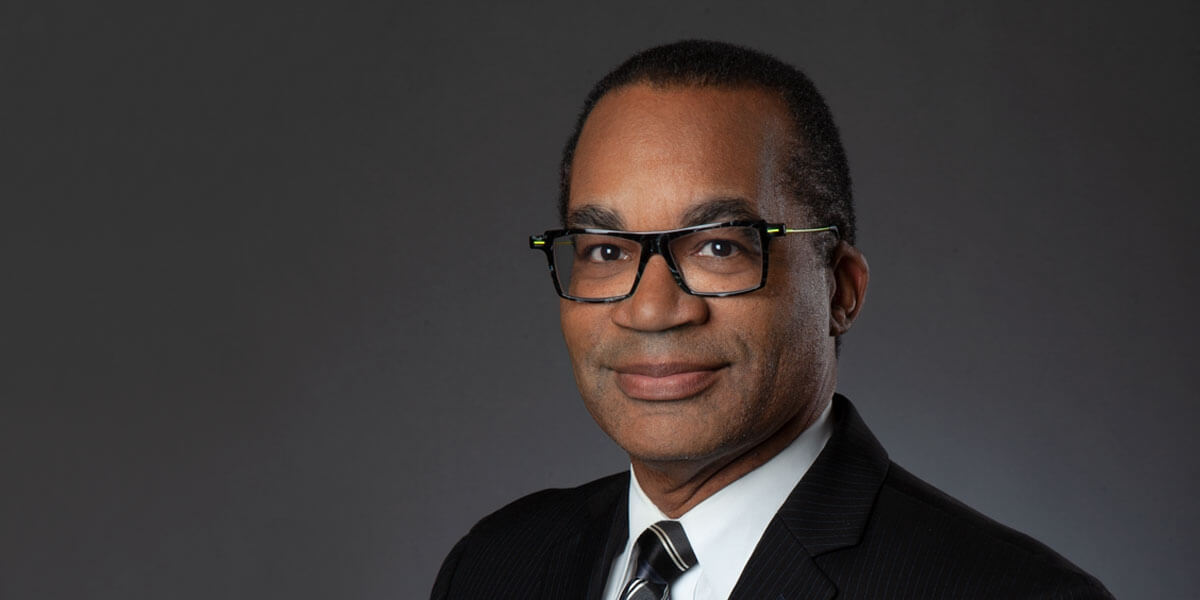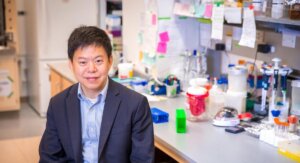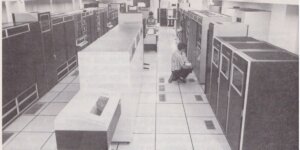
Professor Timothy Pinkston moderated the panel made up of computing leaders from academia, industry, and government (PHOTO CREDIT: USC Viterbi)
The computing world is facing a multi-pronged challenge that is already having profound implications on society at large. Two of these challenges are questions of scarcity and, like most big problems, they are intertwined.
The first scarcity is one of people. According to the National Science Board, by next year the United States will see over three million technical jobs go unfilled for one main reason: we simply do not have enough people with the training necessary to do them. This can and will affect not just our economy, but our national security and prosperity as well.
The second scarcity, however, is much more insidious. It is a scarcity of diverse thought. Simply put, the lack of diversity in technical fields has led us to a point where we are often unable to approach problems from enough different perspectives. From a strictly business outlook, this isn’t good for anyone’s bottom line. But there is much more at stake than that. A homogeneity of thought can act to create societies that are less fair, more exclusive, and unable to effectively address the many global challenges we have entrusted technology to help us solve.
“This is not the computing of 40 years ago,” he said. “Today our industry touches everyone in society every single day. We must consider how our work impacts such a diverse society. The only way to do that is to diversify ourselves.”
John Hennessy, former President of Stanford, current Chairman of Alphabet, and a 2017 ACM Turing Awardee
With these pressing issues in mind, four virtually co-located conferences technically sponsored by two parent major professional societies in the computing field—the Association for Computing Machinery (ACM) and the IEEE Computer Society—hosted a joint session panel on “Valuing Diversity, Equity, and Inclusion in Our Computing Community” to top off their main programs on March 3rd. Hosted by Timothy M. Pinkston, Professor and George Pfleger Chair in Electrical and Computer Engineering and Vice Dean for Faculty Affairs at USC Viterbi, the panel represented only the second main program session in the conferences’ history to address these issues.
“As an accomplished research leader in the field of computing and leader of DEI efforts in the community, Timothy is the first name that came to my mind when I began to think about tackling this ever-challenging issue,” said Murali Annavaram, Professor of Electrical and Computer Engineering at USC Viterbi and organizer of the main program. “He has a keen insight into the challenges faced with advancing DEI in computing and engineering fields.”
“When asked to organize the panel, I realized the strong and perhaps entrenched views some hold in opposition to promoting and valuing diversity, equity, and inclusion in constructive ways,” said Pinkston. “Nevertheless, given the importance of this topic in light of recent and historical events which reveal how systemic and structural this complex issue is, I felt compelled and highly motivated to embrace this opportunity, and I’m very glad I did!” In fact, Pinkston has been an outspoken proponent of this issue for some time, and recently wrote a blog article on the subject for the IEEE Computer Society, which also is posted by the ACM.
True to their scientific roots, panelists Kim Hazelwood, West Coast Head of Engineering at Facebook AI Research, and Margaret Martonosi, Assistant Director for Computer and Information Science Engineering (CISE) at the National Science Foundation (NSF) and a professor at Princeton, highlighted two important first steps: Data and Transparency.
“Too often, people lean on speculation and consider data to be irrelevant or misleading. But as scientists, we can’t trust ourselves to make better decisions without all the data,” said Hazelwood. Of course, there’s no way to know if you have all the data if people and institutions don’t feel safe sharing it. “The way to advance toward equity is to be transparent first and foremost,” said Martonosi. “Tracking and more openly sharing data regarding how well our programs do in cultivating careers for a diverse set of people; that’s essential in the long term.”
Transparent data is a welcomed tool for panelist Natalie Enright Jerger, Co-chair of the ACM’s Council on Diversity and Inclusion and a professor at the University of Toronto. This is the kind of information that helps to develop important initiatives, like increased travel grants for women and a mentoring workshop for undergrads to ensure the next generation of computing professionals is a more diverse one.
“The way to advance toward equity is to be transparent first and foremost. Tracking and more openly sharing data regarding how well our programs do in cultivating careers for a diverse set of people.”
Margaret Martonosi, Assistant Director for Computer and Information Science Engineering (CISE) at the National Science Foundation
John Hennessy, former President of Stanford and current Chairman of Alphabet, and a 2017 ACM Turing Awardee, helped attendees understand why this is so important to computing specifically. “This is not the computing of 40 years ago,” he said. “Today our industry touches everyone in society every single day. We must consider how our work impacts such a diverse society. The only way to do that is to diversify ourselves.” Data, resources, and programming are three important structural tools we need to achieve diversity. But they are by no means the only ones. Leaders can think differently about what their responsibility is—not just to the field of computing but to the real people with whom they interact.
One way to do that is to look outwardly. Bill Dally, Chief Scientist and SVP of Research at NVIDIA, highlighted the need for computing professionals to seek out more personal, one-on-one connections. “We need to step up, be role models, and get involved with young people in high school and middle school. You can change someone’s life at a young age if you can inspire them to pursue a goal,” he said.
But one can also look inside themselves. David Patterson, a professor at UC Berkeley and Distinguished Engineer at Google, and a 2017 Turing Awardee, challenged attendees to think about their own legacy. “Looking back on your career after you retire, what is it that you are going to be most proud of – the number of research papers you put out, or how many people you influenced, helped, and raised up? By embracing a commitment to diversity, people aren’t just enriching the lives of others, they are enriching their own lives as well; and society at large.”
That same sentiment was echoed by Pinkston at the close of the panel. “Some people, unfortunately, buy into the myth that excellence is somehow compromised by diversity when, in reality, it’s just the opposite: excellence is enhanced by diversity. We see this with our own student, faculty, and staff bodies here at USC Viterbi.”
Yannis Yortsos, Dean of the USC Viterbi School of Engineering, agrees with Pinkston’s analysis. “USC Viterbi has led a national ASEE Engineering Diversity Pledge initiative to enhance diversity and inclusion in engineering, now adopted by more than 230 engineering schools. Changing the conversation in engineering about who we are, what we do, and what we look like is an important challenge, one that we are committed to meet for the collective benefit. Vice Dean Pinkston’s chairing an ACM/IEEE panel sponsored by USC Viterbi on the subject is another testament of our commitment to this effort,” he said.
While this panel was a good first step for the computing community to begin thinking more in-depth about this important issue, much is left to be done. The next steps are to start identifying and working toward tangible actions in which all can engage and lead. By helping to provide his colleagues with more tools and outlets, Pinkston is confident that the computing community he loves and has dedicated so much to can and will rise to the challenge.
Pinkston and several computing professional societies continue to work together towards this goal. The ACM Diversity and Inclusion Council’s Systemic Change Committee has launched a survey with the hope that further conversations and actions can be initiated. Responses to the survey will be analyzed and used by this new ACM committee to identify emerging themes, strategies, and milestones which can be tracked and shared with the broader computing community.
The IEEE Computer Society’s Diversity & Inclusion Committee also has a diversity, equity, and inclusion survey on their website. Responses from the technical community to this survey likewise can influence the activities and actions of this committee and may also be shared with the broader computing community as well, to make significant and sustained progress.
Watch the Full Panel Discussion Below
Published on March 8th, 2021
Last updated on May 15th, 2023













